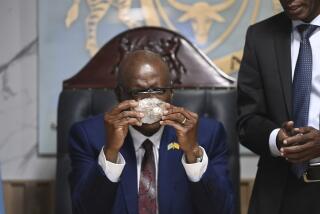In Angola, Diamonds Are a Struggling Smuggler’s Best Friend : Survival: Nearly two decades of civil war have spared only the oil fields, which the government controls, and the lucrative diamond mines, held by the rebels.
LUANDA, Angola — The scarred, burly man opened his hand, displaying one route to riches still available in this nation of ruined cities and civil war.
Fingering an uncut diamond the size of a pencil eraser, the man agreed to tell how he and other adventurers make fortunes dealing in gems smuggled from rebel-held territory in northern Angola.
He used the alias Adolfo and repeatedly insisted, once at gunpoint, that no details be published that might identify him.
“We ate garbage off prison floors for two years. The police beat us. Where do you think these come from?” he said, pointing to his scars.
If arrested again, he would face harsh penalties from a government increasingly frustrated in its attempts to conserve its diamond revenues and stop diamonds-for-arms deals it believes are restocking rebel arsenals.
The risks of smuggling diamonds are great, but so are the profits. Peter Gallegos, who represents the De Beers diamond company in Luanda, estimates the smugglers did at least $500 million in business last year, more than twice Angola’s official diamond sales.
Nearly two decades of civil war between the government and rebels of the National Union for the Total Independence of Angola have destroyed Angola’s factories, wrecked its roads and bridges, and left farms abandoned. It spared only the oil fields, which the government now controls, and the diamond mines, held by the rebels.
The government believes many smugglers made deals with the rebels to stay in business after UNITA forces took Lunda Norte. The riverbeds and valleys of the remote northeastern province hold what could be the world’s fourth-richest diamond deposits.
Adolfo said he does not deal with UNITA but, as a native of Lunda Norte and longtime buyer and smuggler of diamonds, he has seen every aspect of the trade.
He was jailed in the late 1980s as part of a government crackdown intended to reserve the diamond regions for commercial mining companies. Then, in 1991, hoping for at least some profit from unofficial mining, the government legalized marketing of rough gems acquired outside the mining concessions.
“We advised the Angolan government that legalizing independent diamond sales would be disastrous,” said Gallegos of De Beers. “Looking back with hindsight, well, the figures speak for themselves.”
Many new smugglers were soldiers who set their weapons aside after peace accords were signed in May, 1991, and struck out for diamond country, hoping to get rich. Then, in October, 1992, fighting resumed.
Licensed offices pay much less for diamonds than the smugglers can make on the black market, but doing a small percentage of their business legitimately gives the smugglers cover for illegal transactions.
Adolfo said he has three wives, and thus three families, who depend on him. He owns eight new 4-wheel-drive vehicles, a mark of great wealth in a city where most of the 4 million residents must carry drinking water home from public taps.
One of the families and six of the vehicles were visible behind the 10-foot walls of Adolfo’s home. Guards stood at the steel-plated gate and a few men loitered in the rutted road, hoping for a chat with the boss.
“A lot of the diamonds go across the border into Zaire,” Adolfo said. “Some are sold, some get traded for weapons for UNITA that come down from Russia. The middlemen are Lebanese traders. When a smuggler has some stones, UNITA soldiers take him across the border.”
During the initial 16-year phase of the Angolan civil war, the Soviet Union armed the government while the United States and South Africa supported UNITA.
Joao de Matos, the army chief of staff, said his troops had found new Russian-made machine guns in several northern cities retaken from the rebels.
De Matos has accused republics of the former Soviet Union of resupplying the rebels, who were supposed to have disarmed after the peace agreement.
More to Read
Sign up for Essential California
The most important California stories and recommendations in your inbox every morning.
You may occasionally receive promotional content from the Los Angeles Times.










